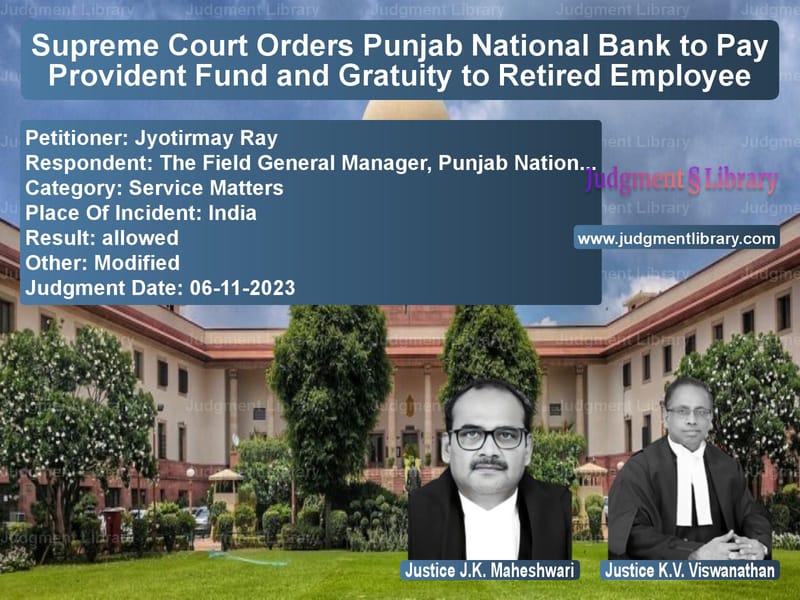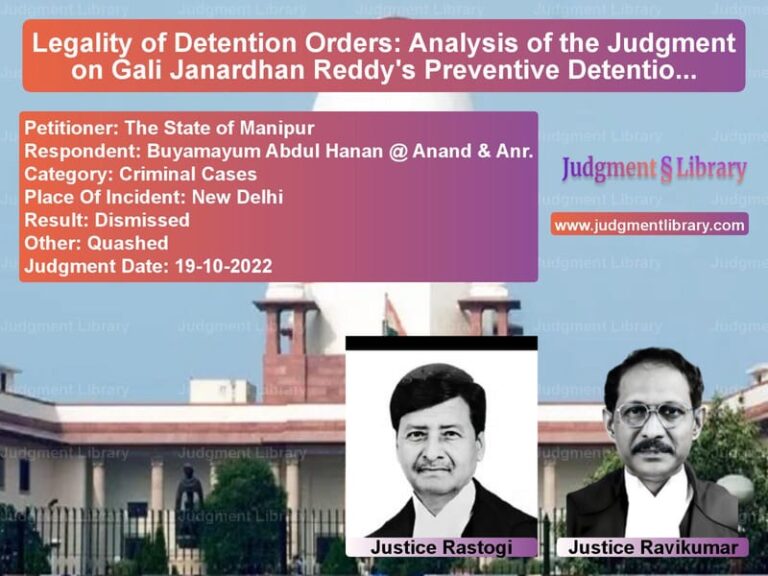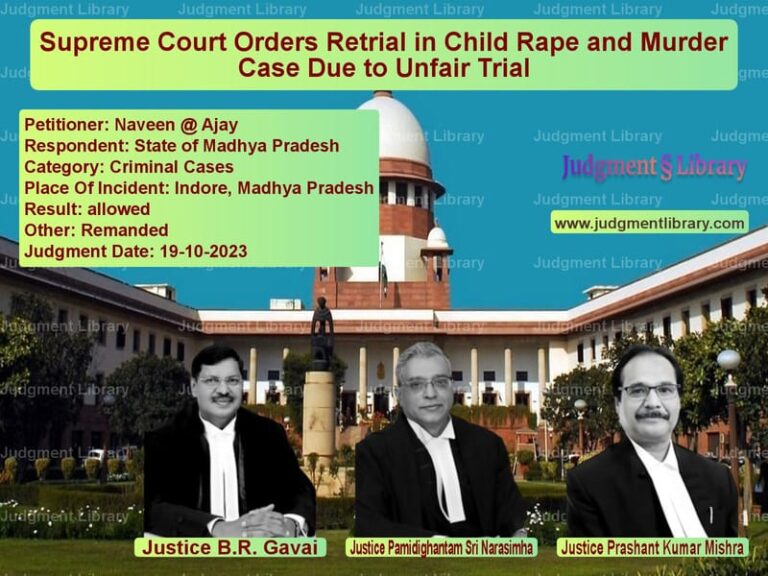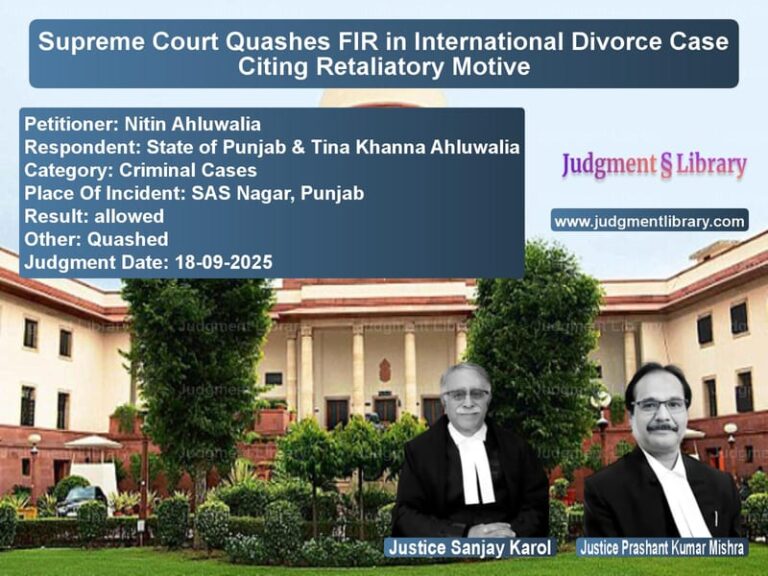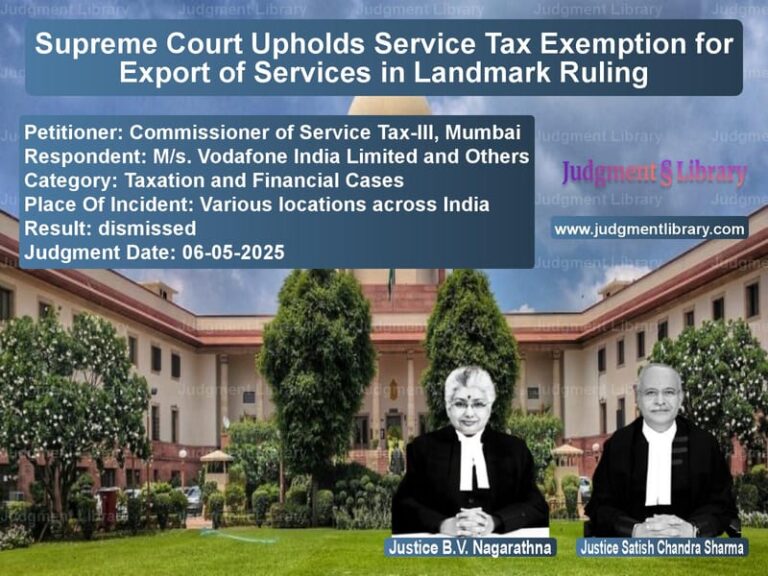Supreme Court Orders Punjab National Bank to Pay Provident Fund and Gratuity to Retired Employee
The case of Jyotirmay Ray vs. The Field General Manager, Punjab National Bank & Ors. revolves around the denial of terminal benefits such as leave encashment, provident fund, gratuity, and pension to an employee who was compulsorily retired by the Punjab National Bank (PNB). The Supreme Court examined whether an employer could lawfully withhold these benefits and provided clarity on the rights of retired employees under banking regulations.
Background of the Case
Jyotirmay Ray, a former Senior Manager at Punjab National Bank, was compulsorily retired on January 29, 2010, following a departmental inquiry that found him guilty of irregularities in granting loans and cash credit facilities under the Credit Guarantee Fund Trust Scheme for Micro & Small Enterprises (CGTMSE). The Bank refused to release his leave encashment, employer’s contribution to the provident fund, gratuity, and pension, citing financial loss due to his misconduct.
After his representations to the bank authorities were rejected, the appellant approached the High Court through a writ petition seeking these benefits.
Trial Court and High Court Proceedings
The Single Judge of the High Court, through an order dated April 3, 2012, partially allowed the petition. The court directed PNB to release the employer’s contribution to the provident fund and gratuity with interest at 8.5% per annum and leave encashment under Regulation 38 of the Punjab National Bank (Officers’) Service Regulations, 1979. However, the claim for pension was denied as the appellant was not in service when the pension scheme became operational.
PNB, dissatisfied with this ruling, filed a Special Appeal before the Division Bench. The Division Bench overturned the Single Judge’s order regarding the payment of the provident fund and gratuity, arguing that the employee had caused financial losses to the bank.
Petitioner’s Arguments
The appellant, Jyotirmay Ray, contended:
- His compulsory retirement did not automatically lead to the forfeiture of terminal benefits, as per banking regulations.
- The Bank had no specific proof of financial loss due to his actions.
- The Punjab National Bank Employees’ Provident Fund Trust Rules allowed forfeiture only if the loss was quantified and proven, which was not the case.
- The Board of Directors’ decision to deny the provident fund contribution was made unilaterally without giving him a chance to respond.
Respondent’s Arguments
The Punjab National Bank argued:
- The petitioner’s misconduct had caused the bank a loss of Rs. 77.59 lakhs.
- The bank’s first lien over its provident fund contributions gave it the right to withhold the amount.
- Gratuity and provident fund were not absolute entitlements but could be forfeited in cases of serious misconduct.
- The Division Bench had correctly overruled the Single Judge’s decision.
Key Legal Issues Considered
1. Can an Employee’s Provident Fund Contribution Be Withheld by the Bank?
The Supreme Court analyzed whether a bank has the authority to withhold its contribution to the provident fund if financial loss is alleged but not proven.
2. Under What Conditions Can Gratuity Be Withheld?
The Court examined the Payment of Gratuity Act, 1972, and the Punjab National Bank Service Regulations to determine whether an employer could legally withhold gratuity after compulsory retirement.
3. Whether the Division Bench Was Justified in Overruling the Single Judge’s Order?
The Court evaluated whether the Division Bench’s reversal of the order to release the provident fund and gratuity was legally sustainable.
Supreme Court’s Verdict
The Supreme Court ruled in favor of the appellant and set aside the Division Bench’s order, restoring the decision of the Single Judge. The key observations were:
- The bank’s claim of financial loss was not substantiated by any findings in the departmental inquiry.
- The Board of Directors unilaterally passed a resolution to withhold benefits without seeking a response from the employee.
- The Punjab National Bank Personnel Division’s Circular No. 1563 (January 16, 1997) states that gratuity is payable unless the termination is by way of dismissal or removal, which was not the case here.
- The Court reaffirmed that the Payment of Gratuity Act, 1972, takes precedence over bank regulations and protects employees from arbitrary withholding of benefits.
- The Division Bench had erred in overturning the Single Judge’s findings without proper reasoning.
Key Takeaways from the Judgment
- Banks Cannot Arbitrarily Withhold Terminal Benefits: The ruling reinforces that banks must have clear proof before denying retirement benefits.
- Principles of Natural Justice Apply to Employee Benefits: Employees must be given a chance to respond before their benefits are denied.
- Gratuity and Provident Fund Are Protected Under Law: The Supreme Court upheld the rights of retired employees under the Payment of Gratuity Act, 1972.
- Banking Regulations Must Align with Labor Laws: Any bank policy that contradicts the Gratuity Act cannot override statutory entitlements.
This judgment sets a precedent for fair treatment of employees who are compulsorily retired and ensures their lawful benefits are protected from arbitrary actions by employers.
Petitioner Name: Jyotirmay Ray.Respondent Name: The Field General Manager, Punjab National Bank & Ors..Judgment By: Justice J.K. Maheshwari, Justice K.V. Viswanathan.Place Of Incident: India.Judgment Date: 06-11-2023.
Don’t miss out on the full details! Download the complete judgment in PDF format below and gain valuable insights instantly!
Download Judgment: jyotirmay-ray-vs-the-field-general-ma-supreme-court-of-india-judgment-dated-06-11-2023.pdf
Directly Download Judgment: Directly download this Judgment
See all petitions in Pension and Gratuity
See all petitions in Employment Disputes
See all petitions in Public Sector Employees
See all petitions in Judgment by J.K. Maheshwari
See all petitions in Judgment by K.V. Viswanathan
See all petitions in allowed
See all petitions in Modified
See all petitions in supreme court of India judgments November 2023
See all petitions in 2023 judgments
See all posts in Service Matters Category
See all allowed petitions in Service Matters Category
See all Dismissed petitions in Service Matters Category
See all partially allowed petitions in Service Matters Category

